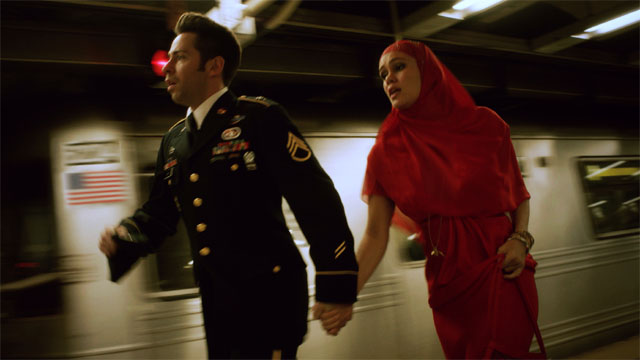“I decided to try to flip the kind of usual story of a vet coming home and loosing his mind, and instead, what if the country lost its mind when the soldier comes home,” writer and director Sean Mullin told Hamptons.com about his first feature film, “Amira & Sam.” We sat down with Mullin, as well as the film’s stars Dina Shihabi and Paul Wesley during the Hamptons International Film Festival.
Mullin, who was a captain in the army and a first responder after September 11th, drew inspiration from his own experiences for “Amira & Sam.” The romantic comedy takes a look at interracial romance in respect to the reality of life in an age of terrorism. Sam (Martin Starr) is an Iraqi war veteran who is struggling to assimilate back into everyday life in an indifferent New York City. An Iraqi refugee, Amira (Dina Shihabi), enters Sam’s world in a whirlwind and forever changes it.
“The Vampire Diaries” star Paul Wesley plays Charlie, Sam’s driven cousin who after realizing he can leverage Sam’s army ties, enlists Sam to work for his Wall Street firm. “I read it [the script] and I thought it was great,” noted Wesley. “I thought it was the opposite of the character I do on ‘The Vampire Diaries.’ I’ve never played a Wall Street guy.” Wesley, who had seen Mullin’s short film, “Sadiq,” was impressed with the director. While the actor was familiar with Martin Starr from projects like “Freaks and Geeks,” his first encounter with Shihabi was her reading for “Amira & Sam.” “I had seen Dina Shihabi’s audition secretly and I was blown away by it,” said Wesley.
Mullin was equally as excited with the footage. “With Dina I didn’t know of her work, but her audition was incredible. I didn’t finish watching the entire audition, I made it about halfway through and I just stopped it. I called my producers and said that’s Amira. She just popped to life for me.”
 |
|
Martin Starr and Dina Shihabi in “Amira & Sam.” (Courtesy Photo) |
To prepare for her first major role, Shihabi researched what was happening to the families of translators in Iraq and she found it shocking. “It’s not spoken about enough what happens to them,” said the actress. “It’s not really spoken about in the film too much but I just wanted to know where I came from.” While she speaks Arabic fluently, she speaks a Palestinian Arabic or Lebanese Arabic, so she had to learn a completely different dialect of Arabic. She and Laith Nakli, who plays her uncle in the film, reached out to one of his friends from Iraq, who recently came to America, and had him recite the script, which they recorded and she listened to repeatedly to make sure she was speaking authentically.
“To me, the most valuable type of storytelling is challenging perceptions and there’s this tension that exists between perception and reality,” noted Mullin. The director used the film as an opportunity to defy stereotypes. “It’s easy to paint somebody just with a single brush stroke and assume they’re this type of person, but underneath everyone has their own story.”
Mullin took a laid back approach to the script, and was even receptive to suggestions from the actors, like when Wesley suggested his wife in the film be pregnant. “I’m very much the Woody Allen school of thought where it’s like if I can recognize my story on screen I’m happy,” Mullin told us. Wesley believed the addition would create a more relatable character. “I wanted him to have an agenda. I wanted him to have a soul. I wanted the audience to empathize with him, even though he was flawed.” Which is precisely why Wesley thought having a pregnant wife made him less villainous. “I said, ‘Why is Charlie doing all this? What if his wife’s pregnant? He has a baby. There’s more stakes. He needs to put food on the table.’ An excessive amount but you know money’s money.”
 |
|
Paul Wesley at the HIFF Chairman’s Reception. (Photo: Rob Rich/SocietyAllure.com) |
The cast was open to improv as well. “Obviously a lot of the dialogue stuck but there were moments where Sean was like, ‘Just have fun, play with it’ and I think a lot of those moments ended up on screen,” said Wesley. “Some of my favorite films of all times, I look at the behind the scenes or I look at the making of and all of them are like we just came up with that on the spot. All the great moments, ‘Midnight Cowboy,’ Dustin Hoffman walking across the street ‘Hey, I’m walking here’ you know, that was improv. All those moments are these sort of serendipitous like moments.”
“It makes you very present,” Shihabi added.
The director had a similar outlook. “To me the best thing as a director, it allows them to be in the moment,” shared Mullin. “The last thing I want is for an actor to be self aware of themselves or that they’re acting.”
One of the scenes that stood out for all three was a bedroom scene between Shihabi and Starr where the two finally begin to fall for each other. “You start that scene and they’re kind of on other ends of the spectrum and at the end you’re like ‘okay they are a team,'” said Mullin. “It’s one of those rare scenes that makes you laugh but also makes your heart swell a little bit.” Filmed in a tiny apartment bedroom, the scene is a pivotal point in the relationship and interestingly enough it was a candid moment during filming. “I think it was different every time we did it,” explained Shihabi.
While Wesley wasn’t part of that moment, he found it moving, “That was my favorite scene in the movie. Seven minutes, no cuts, just the two of them. I mean, that’s a Woody Allen shot.”
“At one point [during filming] I didn’t sleep for three days. But the film came out great so clearly it was okay,” Wesley joked. To be clear, the actor was working on both the film and his regular day job at “The Vampire Diaries” simultaneously. “I’m so confused by the story lines that I don’t even keep track of it,” Welsey told us enigmatically being purposefully vague about season six of the hit CW show. Although he did give us some insight, Wesley thinks a hook up between his character and Caroline (Candice Accola) is imminent.
“Amira & Sam” made its world premiere at the Seattle International Film Festival, its East Coast premiere at the Hamptons International Film Festival, and also screened at the Woodstock Film Festival. The film was sold to Drafthouse Films with a limited release in 20 cities. “It’s quite an accomplishment for a small indie film,” expressed Wesley.
For more information on HIFF, visit hamptonsfilmfest.org.












